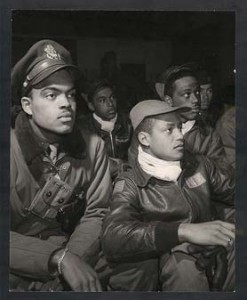My Country Did That?
On Friday, a group of teachers in one of ASHP’s Teaching American History faculty development programs had the singular pleasure of hearing a talk by Dr. Roscoe Brown, an educator, former television host, and ASHP neighbor at The Graduate Center. He is also a veteran of the Tuskegee Airmen, the famed World War II corps of African-American fliers who broke a key color barrier by becoming the first black military pilots in U.S. history. Brown’s spellbinding account of his experiences on the ground and in the air deftly wove together personal experience and historical perspective, and drew in part upon the research he has conducted in the decades since his service into how the U.S. military clung to racist notions of African-American inferiority, which eventually withered in the face of black accomplishment that defied racist stereotypes. He wrapped his experiences and the historical evidence into a simple but powerful conclusion: that from the Tuskegee Airmen to President Obama, competence ultimately beats racist ideology.
Dr. Brown speaks frequently, before many types of audiences in person and via the numerous documentaries in which he has been featured. He summed up the reactions of some young white students who have heard him speak as a surprised and ashamed, “my country did that?” And they are reacting, of course, to the raw injustice of segregation that he so matter-of-factly recounts. But it occurred to me, as I listened to him speak, that if you define “country” as being made up of individuals who challenged gender and racial stereotypes on the battlefield and in the munitions factory, something quite extraordinary and inspiring happened during the crisis of WWII, something that planted the seeds for more profound changes yet to come. Not a revolutionary historical insight, I admit, but one that had a particular power for me given our current moment of crisis.
Last 5 posts by Ellen Noonan
- Five Years - October 11th, 2012
- Patriotic Celebrations - July 4th, 2012



